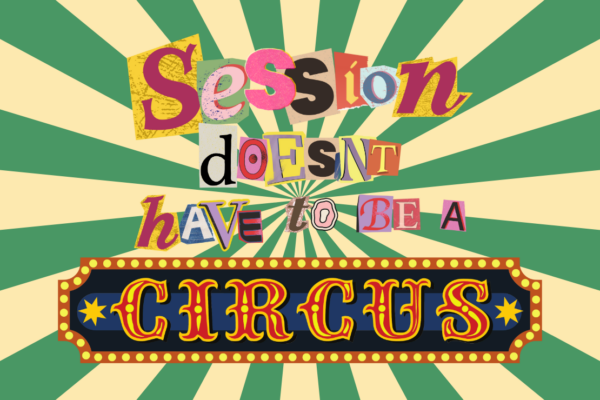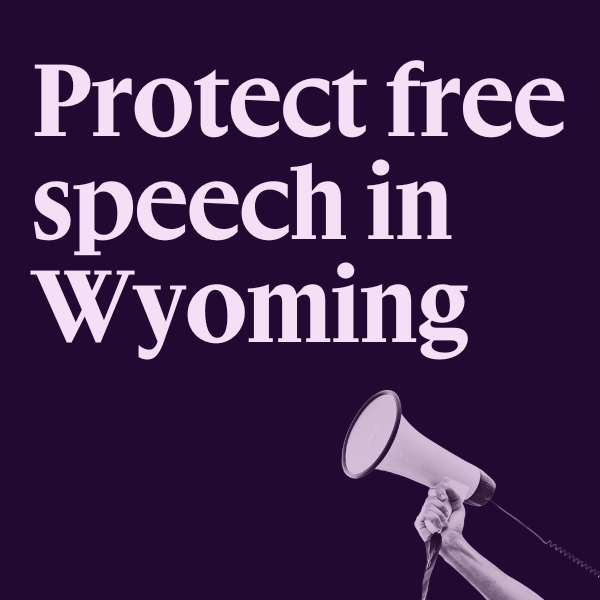Free Speech
Protecting free speech means protecting a free press, the democratic process, diversity of thought, and so much more. The ACLU has worked since 1920 to ensure that freedom of speech is protected for everyone.

Protecting free speech means protecting a free press, the democratic process, diversity of thought, and so much more. The ACLU has worked since 1920 to ensure that freedom of speech is protected for everyone.
“Freedom of expression is the matrix, the indispensable condition, of nearly every other form of freedom.”
—U.S. Supreme Court Justice Benjamin N. Cardozo in Palko v. Connecticut
Freedom of speech, the press, association, assembly, and petition: This set of guarantees, protected by the First Amendment, comprises what we refer to as freedom of expression. It is the foundation of a vibrant democracy, and without it, other fundamental rights, like the right to vote, would wither away.
The fight for freedom of speech has been a bedrock of the ACLU’s mission since the organization was founded in 1920, driven by the need to protect the constitutional rights of conscientious objectors and anti-war protesters. The organization’s work quickly spread to combating censorship, securing the right to assembly, and promoting free speech in schools.
Almost a century later, these battles have taken on new forms, but they persist. The ACLU’s Speech, Privacy, and Technology Project continues to champion freedom of expression in its myriad forms — whether through protest, media, online speech, or the arts — in the face of new threats. For example, new avenues for censorship have arisen alongside the wealth of opportunities for speech afforded by the Internet. The threat of mass government surveillance chills the free expression of ordinary citizens, legislators routinely attempt to place new restrictions on online activity, and journalism is criminalized in the name of national security. The ACLU is always on guard to ensure that the First Amendment’s protections remain robust — in times of war or peace, for bloggers or the institutional press, online or off.
Over the years, the ACLU has frequently represented or defended individuals engaged in some truly offensive speech. We have defended the speech rights of communists, Nazis, Ku Klux Klan members, accused terrorists, pornographers, anti-LGBT activists, and flag burners. That’s because the defense of freedom of speech is most necessary when the message is one most people find repulsive. Constitutional rights must apply to even the most unpopular groups if they’re going to be preserved for everyone.
Some examples of our free speech work from recent years include:
- The ACLU filed amicus briefs on behalf of The Slants, an Asian-American band that had been denied a trademark because the Patent and Trademark Office had deemed its name “disparaging” to Asian-Americans.
- In 2016, the ACLU filed a lawsuit on behalf of environmental and racial justice activists in Uniontown, Alabama, who were sued for defamation after they organized against the town’s hazardous coal ash landfill.
- In 2014, the ACLU filed an amicus brief in Elonis v. United States, arguing that subjective intent to threaten is required for someone to be prosecuted for making threatening statements.
- In 2014, the ACLU of Michigan filed an amicus briefarguing that the police violated the First Amendment by ejecting an anti-Muslim group called Bible Believers from a street festival based on others’ violent reactions to their speech.
- In 2012, the ACLU of Georgia filed a lawsuit against the state of Georgia for denying the Ku Klux Klan’s application to participate in an “adopt a highway” program.
- In 2010, the ACLU filed an amicus brief at the Supreme Court arguing that the First Amendment protects the Westboro Baptist Church’s anti-LGBT protests at military funerals.
Take Action
Today, years of hard-fought civil liberty protections are under threat.
To influence lawmakers, we need everyone to get involved. Here are 2 actions you can take today.
Stay Informed
Sign up to be the first to hear about how to take action.
By completing this form, I agree to receive occasional emails per the terms of the ACLU’s privacy statement.
By completing this form, I agree to receive occasional emails per the terms of the ACLU’s privacy statement.






